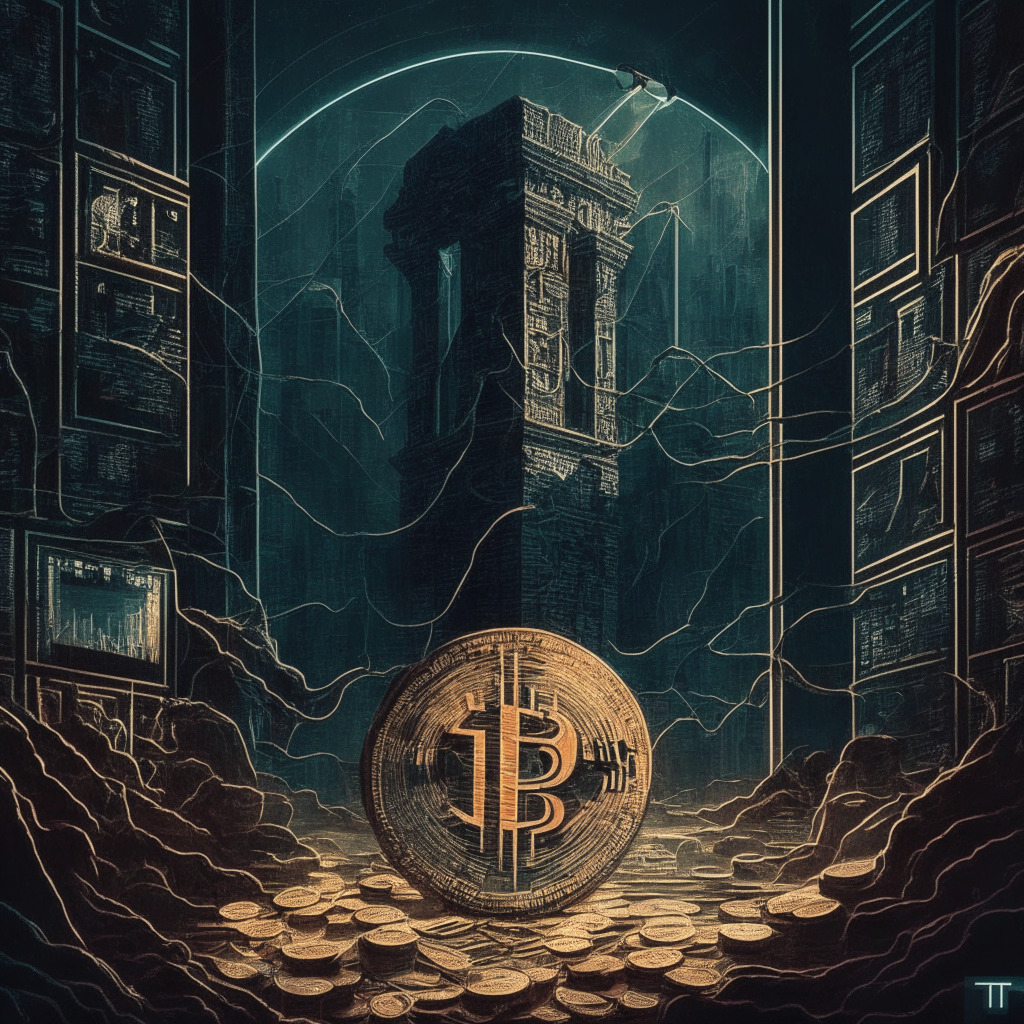The Biden administration proposes a 30% tax on crypto mining firm’s energy costs, aiming to counter environmental pollution, higher energy prices, and increased greenhouse gas emissions. However, this industry-specific penalty could impact profits and faces resistance from congressional Republicans.
Search Results for: US Treasury Department
Poloniex Pays Millions in U.S. Treasury Settlement: Costly Compliance Lesson for Crypto Exchanges
In a recent development, cryptocurrency exchange Poloniex has agreed to pay a hefty sum of […]
Defying Sanctions: Ethereum’s Tornado Cash & The Power of Crypto Resilience Amid Controversy
Despite facing US Treasury Department sanctions in August 2022, Tornado Cash has reportedly circulated $77.35 million worth of assets on Ethereum mainnet over the last month, according to blockchain intelligence firm, Arkham. The US allegations pertain to the platform’s use by North Korean hacker group, Lazarus Group, for money laundering. After an initial slump, Tornado Cash’s current total volume locked stands at $187.9 million.
Navigating the New Taxation Pathway for Crypto: Benefits, Challenges, and Unresolved Questions
The US Treasury Department has defined centralized crypto exchanges and certain wallet providers as “brokers”, tying them with tax-reporting responsibilities. This response to the 2021 Infrastructure Investment and Jobs Act intends to bring clarity on taxation of digital assets. However, decentralized exchanges, miners and issues of individual privacy still remain in a grey area.
Crypto Bill Debate: Balancing Investor Protection and Market Innovation
Rep. Maxine Waters seeks input from the US Treasury Department and the SEC on the potential impact of the latest crypto bill proposed by Republicans. She questions the bill’s effectiveness in protecting investors, changing the roles of the SEC and Treasury in the crypto market, and its possible threat to financial market stability. The outcome could significantly shape the future of crypto businesses and industry-wide regulations.
Crypto Market Decline: Asia Trading Hours Impact and Future Predictions
The global crypto market experienced a decline, with Bitcoin and Ethereum dropping 2%. Investors have been liquidating holdings as Bitcoin’s price closes 8% lower for the first time this year. Despite bullish outlooks, a short-term decline is expected due to a debt ceiling deal prompting a T-bill issuance from the US Treasury Department.
Hefty Penalties on Crypto Exchanges: Fair or Stifling Innovation?
Cryptocurrency exchange Poloniex has agreed to pay a $7.6 million settlement to the US Treasury Department’s OFAC for violating sanctions and improper KYC practices from 2014-2019. This raises concerns about whether such penalties are fair or stifling innovation in the blockchain industry, as small startups may lack resources to establish robust compliance programs. Finding a balance between investor protection and encouraging innovation remains a challenge.
Poloniex Settlement: Navigating Compliance and Innovation in Crypto Landscape
Poloniex LLC settles with the US Treasury Department, paying over $7 million for alleged sanctions violations. This case emphasizes the importance of compliance and robust regulatory frameworks in the ever-evolving crypto landscape.
Balancing Act: Ethereum’s Quest for Privacy, Regulation, and Decentralization with Privacy Pools
Ethereum’s co-founder, Vitalik Buterin, leads a privacy protocol initiative, ‘Privacy Pools,’ employing zero-knowledge proofs to verify user funds legitimacy, preserving transactional privacy. The protocol aims to create a separation that filters out funds related to criminal activities, harmoniously balancing financial privacy and regulation.
Bitcoin Bearish: Exploring Recent Market Volatility in the Crypto World
“As the cryptocurrency world evolves, Bitcoin faces pressures including US sanctions against the Tornado Cash crypto platform and legal wrangles involving Craig Wright’s claim to a large sum of Bitcoin. The industry struggles to balance privacy and compliance, while Bitcoin’s bearish momentum and a notable rise in routine transactions indicate shifts in the crypto-verse.”
Emerging Darknet Task Force: Unveiling Future of Crypto Regulation and Criminal Adaptation
The “Darknet Marketplace and Digital Currency Crimes Task Force” showcases the growing concern related to digital currencies in crime. This task force, consisting of agents from various federal agencies, seeks to dismantle criminal organizations taking advantage of digital currencies’ anonymity and raises questions about the future of cryptocurrencies and the increasing need for regulatory measures.
SEC Crackdown on DeFi and Stablecoins: Analyzing Pros, Cons, and Market Implications
The SEC is potentially targeting decentralized finance (DeFi) and stablecoins, including Tether (USDT) and USD Coin (USDC), in its enforcement crackdown, according to a Berenberg report. Stablecoins, essential to the DeFi ecosystem, have raised national security concerns due to weak sanctions and money laundering controls. The SEC aims to weaken DeFi’s capacity to rival regulated exchanges and lenders.
Gary Gensler’s SEC Actions Impact on Bitcoin – Analyzing Market Trends & Outlook
The SEC’s recent actions against Binance and Coinbase have put Bitcoin’s price at an inflection point, causing traders to expect sideways movement for at least a week. Despite obstacles, the overall outlook for Bitcoin remains bullish this summer, with a possible breakout in July or early August.
Surging Metaverse Coins: Decentraland, Sandbox, and Axie Infinity’s Bullish Breakouts Analyzed
Metaverse coins like Decentraland, Sandbox, and Axie Infinity demonstrate potential for bullish breakouts and further price rallies. However, traders must consider ongoing market pressures and tread cautiously in their investments, balancing both optimistic and skeptical viewpoints.
Ethereum Co-Founder’s Massive $41M ETH Sale: Impact on Price and Market Speculation
Ethereum co-founder Jeffrey Wilcke transferred 22,000 ETH ($41.13 million) to Kraken, fueling speculation of a significant ETH price drop. This follows previous large-scale ETH sales by the Ethereum Foundation and co-founder Vitalik Buterin, creating uncertainty in the crypto community.
Debt Ceiling Deal Impact: Crypto Stability Amid Recession Fears
Positive market sentiments in global stock and crypto markets follow the Biden-McCarthy Debt Ceiling Deal and U.S. Federal Reserve’s potential interest rate decision. However, risks remain for volatile assets like cryptocurrencies due to uncertain macroeconomic conditions, regulatory challenges, and weak technical charts. Conduct thorough research before investing in cryptocurrencies.
Balancing Financial Security and Privacy: The Tornado Cash Sanctions Debate
The Blockchain Association supports Coin Center’s lawsuit against the US Treasury over its sanctions against Tornado Cash, arguing that the sanction raises regulatory and constitutional concerns. The case outcome could set a precedent for privacy-protecting services in the digital asset industry, emphasizing the need to balance financial security and individual privacy.
Hacker Hijacks Tornado Cash, Launders Stolen Funds, and Returns Control: Exploring the Risks
The hacker who hijacked cryptocurrency mixer Tornado Cash returned control to its team, despite laundering stolen funds on the platform. This highlights the risks linked to privacy-enhanced solutions and Tornado Cash’s use by cybercriminals for hiding illicit transactions.
Debt Ceiling Deal Looms: Analyzing Its Impact on Cryptocurrency and Traditional Finance Markets
US President Joe Biden and Republican leader Kevin McCarthy are finalizing a deal to raise the $31.4 trillion debt ceiling, while core PCE inflation hits 4.7%, impacting interest rates and causing Bitcoin price drop. The debt ceiling deal and inflation data reveal the complex relationship between traditional finance and the cryptocurrency market.
Railgun DAO & Chainway Forge Alliance: Striking Balance Between Privacy and Compliance
Railgun DAO partners with Chainway to incorporate a “proof of innocence” feature, addressing AML and sanctions compliance concerns without compromising user privacy. The feature enables users to mathematically demonstrate their funds’ legality and verify blacklisted addresses while maintaining anonymity.
Pivotal Move: How the UK’s Regulatory Changes Could Shape the Global Crypto Landscape
“The United Kingdom could potentially leapfrog the US in Web3 crypto environments, contingent on an unconventional regulatory trajectory. Changes like curbing liabilities for DAO token holders and amending FCA’s KYC guidelines could catalyze growth in emerging technologies. Nonetheless, the crypto evolution is challenged by potential misuse and regulatory hurdles.”
Sanctions on Crypto Wallets Reveal Unwavering Regulatory Power and Challenge Decentralization Ethos
“The US Department of Treasury imposed sanctions on digital wallets tied to illicit activities by Chinese firms, revealing the reach of regulatory bodies in tracking crypto transactions on BTC, ETH, USDT, and TRX blockchains. This emphasizes the growing interlink between blockchain and regulation, pointing towards an era of advanced blockchain forensics.”
Shadows Over Crypto: Fentanyl Sanctions, Regulatory Barriers, and the Future of Bitcoin
Bitcoin saw a slight downturn recently amid challenges such as the US Treasury’s move to outlaw cryptocurrency wallets and a crackdown on illicit substances like fentanyl. Additional regulatory barriers in the US are hindering crypto innovation, leading to concerns over future Bitcoin prices and investor sentiment.
Regulatory Grip Tightens on Crypto: Analyzing the Ripple Case and Crypto Wallets Sanctions
Recently, a motion by the SEC against Ripple hit a roadblock in court due to the regulatory body’s failure to address substantial legal questions. This highlights the complex legal environment surrounding crypto assets. These developments, including new sanctions on crypto wallets, suggest that the road to comprehensive blockchain regulations is fraught with controversy and challenges.
Crypto Wallet Sanctions: A Necessary Countermeasure or a Threat to Blockchain Progress?
“US authorities sanctioned a series of crypto wallets connected to fentanyl manufacturing, casting a sceptical light on the blockchain sphere. These developments spotlight identity concealment and transaction monitoring issues on blockchain platforms. Balancing the issue, blockchain’s global scalability brings potential for a more democratised financial future, requiring robust regulations and security measures.”
Crypto Scams and Increased Regulatory Scrutiny: A Double-Edged Sword for Investor Safety
The US Commodity Futures Trading Commission (CFTC) has cracked down on Mosaic Exchange Limited and its owner, Sean Michael, for fraudulent digital asset commodity practices. While regulatory bodies are stepping up their game against fraudulent cryptocurrency activities, the rise in ransomware and increased sophistication of crypto-crime highlight the need for vigilant investors.
Bank Ruin and Crypto Scam: A Cautionary Tale from Kansas Heartland
“In a blow to Heartland Tri-State Bank, its CEO lost millions in a cryptocurrency scam. This incident highlights the risks attached to crypto investments, ultimately leading to the bank’s insolvency. The event underscores the need for regulation and vigilance in the crypto landscape.”
Regulatory Tightrope: Striking Balance between Crypto Transparency and Investor Safety
U.S. Sen. Sherrod Brown’s call to regulators for promoting transparency and safeguarding investor interests suggests a push for stronger authority over digital assets. This results in questioning the readiness of the crypto enthusiasts to embrace potential regulatory changes in the crypto realm.
The Tug of War: The U.S.’s Potential Leap into Digital Currency vs Fears of Surveillance
The U.S. House of Representatives is considering the introduction of a Central Bank Digital Currency (CBDC), amidst contrasting views. Democrat Rep. Stephen Lynch calls for a pilot project for a digital dollar, stressing it is “absolutely critical” for the U.S. to show leadership in digital currency development. However, concerns remain regarding transaction management, tracking, and potential regulatory limitation issues.
Fed’s Potential $100B Loss and Its Impact: Turmoil or Triumph for Bitcoin?
Industry analyst Marcel Pechman discusses the challenges inflation presents to the Federal Reserve and the potential financial risks of their lenient monetary strategy. He suggests these issues may lead individuals to explore secure alternatives like Bitcoin and other blockchain technologies.
Google’s Blockchain Turnaround: The Dawn of NFT Gaming Advertisements and the Hidden Implications
Google has revised its advertising policy to permit promotion of blockchain-powered non-fungible token (NFT) games, affecting NFT games that abstain from promoting gambling content. However, it maintains its prohibition against game advertisements where players risk NFTs for earning additional digital assets.
Blockchain Regulation: A Comparative Study of Nigeria’s Leaps and America’s Gains
“The article examines the progress of blockchain regulation from two contrasting perspectives: Nigeria, known for its cryptocurrency-awareness, and the US, with its comprehensive regulatory frameworks. The piece discusses the regulatory challenges in Nigeria and the US’s approach in achieving a balance between enforcement and tech evolution.”































